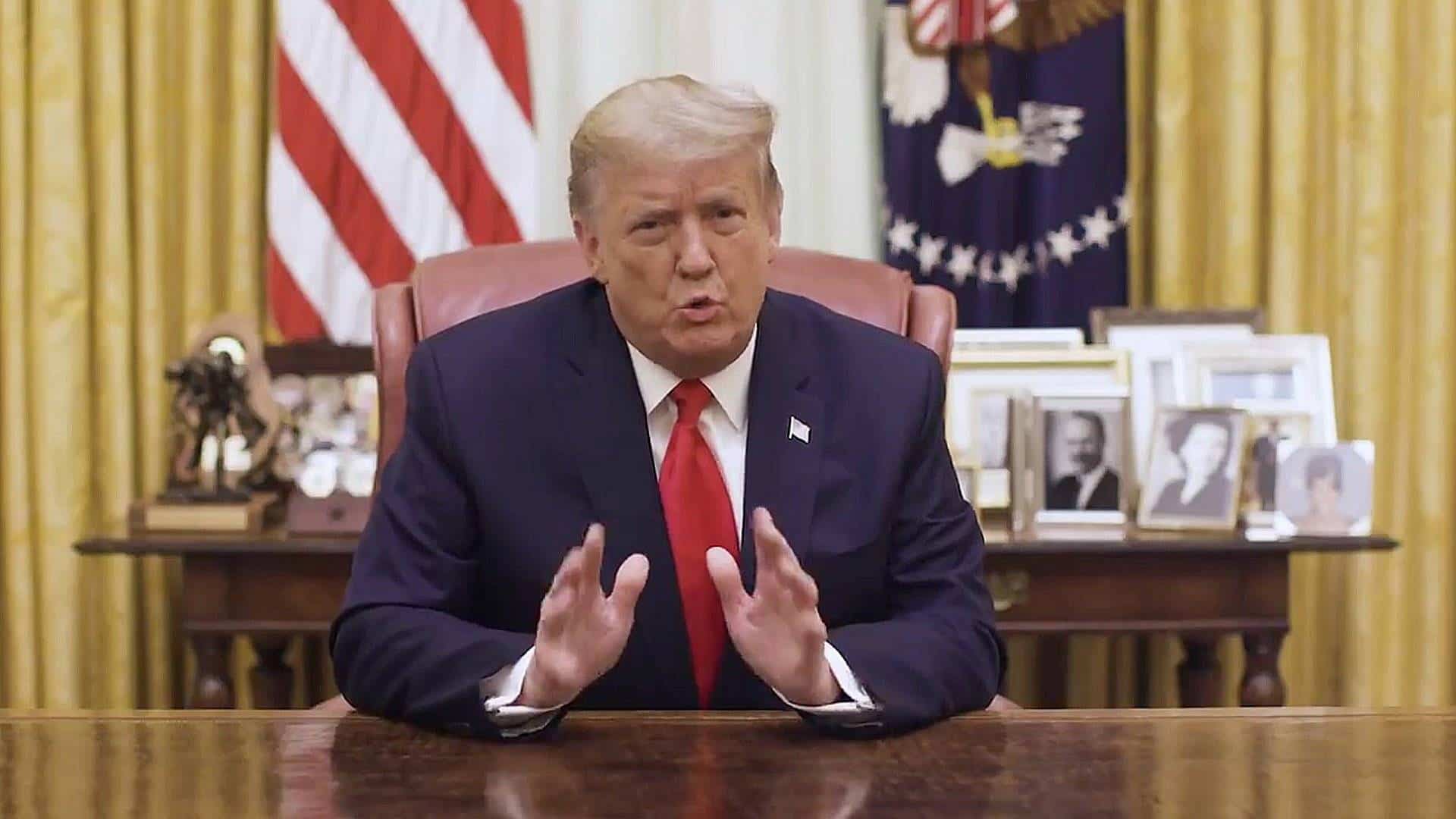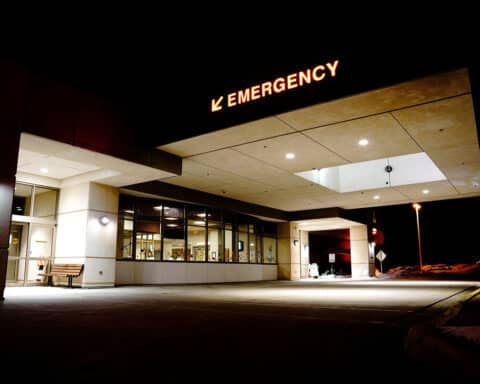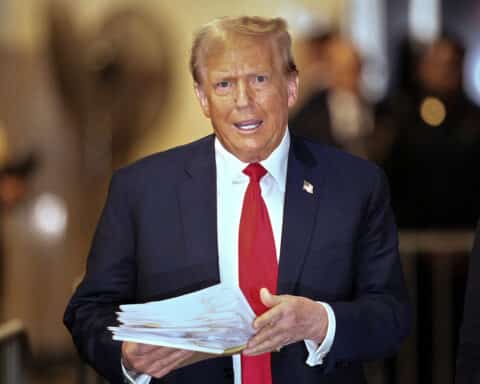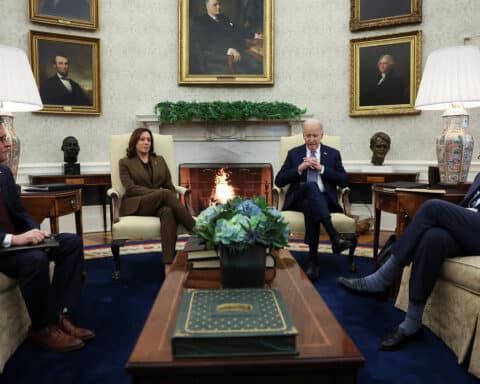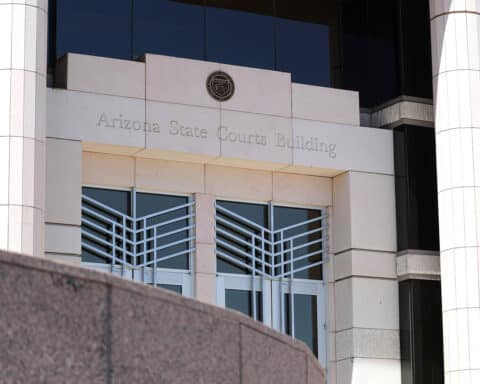WASHINGTON (OSV News) — Former President Donald Trump celebrated the first anniversary of the U.S. Supreme Court’s decision in Dobbs v. Jackson Women’s Health Organization June 24 at a conference for social conservatives in the nation’s capital, vowing to once again release the names of his potential Supreme Court nominees before Election Day.
During his candidacies in 2016 and 2020, Trump released a list of his potential nominees for the Supreme Court in what was seen as a bid to win over social conservatives skeptical about his position on abortion and who were seeking the reversal of Roe v. Wade. Trump and some of his allies have since credited that decision in part with helping him win his term in the White House in 2016.
The Road to Majority Conference hosted by the Faith and Freedom Coalition was the first “cattle call,” or event featuring a lineup of candidates, of the 2024 GOP presidential primary cycle. The June 23-24 conference overlapped with the first anniversary of the Dobbs decision, prompting Republican presidential hopefuls to address the issue of abortion to a primarily evangelical and pro-life audience, previewing how each candidate plans to discuss the issue with voters. Other candidates, including former New Jersey Gov. Chris Christie, former Vice President Mike Pence and Florida Gov. Ron DeSantis, spoke at the conference the previous day.
Trump’s court nominees
Trump said he nominated “three great” Supreme Court justices, who one year ago were “the pivotal votes of the Supreme Court’s landmark decision ending the constitutional atrocity known as Roe v. Wade.”
“They’d been fighting, good people, strong people, smart people, had been fighting for 50 years and it never even came close to getting done,” Trump said. “I don’t believe they’ve ever even taken a vote, I mean, never even came close, it was something that wasn’t gonna happen. I got it done.”
Dobbs, Trump said, gave pro-life activists and lawmakers “tremendous power to negotiate” on pro-life policies. Arguing the federal government has a “vital” role in protecting life, Trump however did not specify any particular gestational limits on the procedure he would support as president at a federal level.
“Before you had nothing to negotiate with,” Trump said. “Today, you’re in the driver’s seat, you’re very much in the driver’s seat.”
Trump said his next potential nominees would be “rock solid conservative judges in the mold of justices like Antonin Scalia and the great Clarence Thomas.”
Praising Justices Neil Gorsuch, Brett Kavanaugh and Amy Coney Barrett, the three he nominated to the court, Trump however then went on to say he hopes they “remain strong in the face of the harassment and intimidation that is coming their way and has come their way by the radical left lunatics.”
Trump previously spoke critically of the Supreme Court for rejecting his baseless claims about the 2020 election, particularly singling out Kavanaugh, whom he backed during a contentious confirmation process.
Trump addresses Catholics
Trump initially hesitated to publicly celebrate the Dobbs ruling in its immediate aftermath, even making comments blaming pro-life voters for Republicans’ relative underperformance in the 2022 midterm elections. But during his ongoing third bid for the White House, Trump has praised the Dobbs ruling.
But at the conference, Trump took aim at his Republican rivals for making what he said were arguments that they are more pro-life than he is.
“I’m proud to be the most pro-life president in American history,” Trump said.
Much of Trump’s speech centered on his unfounded claims that the 2020 election was stolen from him, and dismissing his recent indictments as political witch hunts orchestrated by his political rivals.
In his remarks, Trump accused President Joe Biden’s administration of “an assault on Catholics,” singling out the arrest of a pro-life activist and a withdrawn FBI memo about white nationalist ties to a small number of Catholic groups.
“Christians have been under siege in this administration,” he said.
Trump said he was “gratified” by the support of many religious voters.
“Saturday night, we’re here for religion, isn’t that nice?” Trump said.
Trump also thanked Frank Pavone, the national director of Priests for Life, who was laicized last year after a public dispute with his bishop, who spoke at the conference. Pavone later faced accusations of sexual misconduct during his tenure at Priests for Life.
Remarks from Ambassador Nikki Haley
Earlier June 24, former U.N. Ambassador Nikki Haley, who also is seeking the Republican nomination, touted her signature on pain-capable legislation banning elective abortions at 20 weeks while she was governor of South Carolina.
“I think it’s time that we look at this and deal with it the right way,” Haley said. “I am unapologetically pro-life. I’m not pro-life because the Republican Party tells me to be. I’m pro-life because my husband was adopted, I had trouble having both of my children… But we need to make sure that our country stops demonizing this issue and we humanize this issue.”
Haley backed pro-life efforts including protecting the conscience rights of health care workers who do not wish to participate in abortion procedures on moral or religious grounds, providing additional resources to women facing unplanned pregnancies and facilitating more adoptions. But she acknowledged that the odds of passing federal limits on abortion are slim unless pro-life lawmakers hold a House majority, a Senate majority large enough to overcome the upper chamber’s filibuster rules and the White House.
“Now a wrong has been made right,” she said. “And we’ve taken it back away from the unelected justices, and we’ve put it back in the hands of the states.”
Haley also condemned some attempts to criminalize women who undergo abortion. One such proposal by an anti-abortion lawmaker in her native South Carolina was rejected. That bill would have subjected women who undergo abortions to the death penalty, a measure that was condemned by pro-life leaders.

